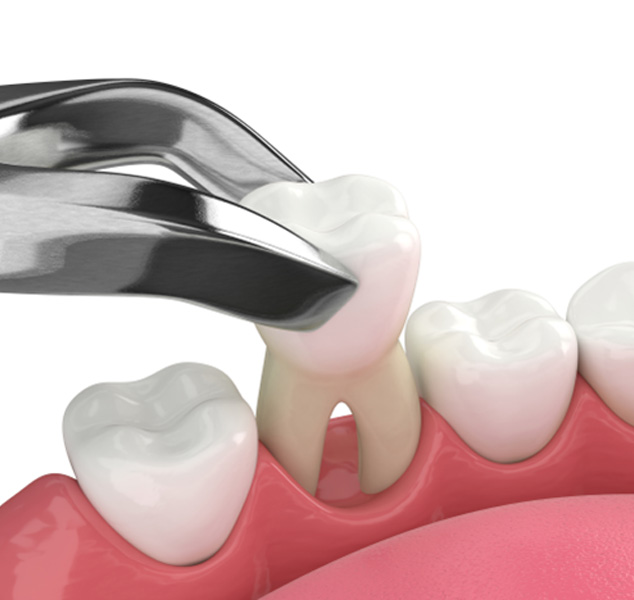Tooth Extractions – Springfield, MA
Comfortable & Safe Tooth Removal
No one likes the idea of having a tooth removed, but it’s sometimes the only solution when it comes to protecting someone’s oral health. Rest assured, we only recommend tooth extractions in Springfield after eliminating more conservative options, like root canal treatment, and we take every step imaginable to ensure patients stay comfortable while in the chair. If you have any questions about this emergency dental procedure, you’re more than welcome to give us a call. Or, you can read on to learn more about it!
Why Choose Dr. Laura Gramse Family Dental Care for Tooth Extractions?
- Dentist with 25+ Years of Experience
- Convenient Locations in Springfield & Palmer
- Same-Day, After-Hours, & Weekend Emergency Appointments
Reasons Why Tooth Extractions Are Necessary?

It might be time for a tooth to come out if it…
- Is damaged or decayed beyond repair
- Is loose because gum disease has damaged the root
- Prevents us from placing a well-fitted denture
- Takes up space needed for orthodontic treatment
At your appointment, Dr. Laura Gramse will ask you a few questions about the symptoms you’ve been experiencing, review your latest X-rays, and take a look at the tooth in question to determine if an extraction is necessary. If it is, she will get to work on creating your custom treatment plan and review the next steps.
The Process of Removing a Tooth

The process of removing a tooth will look a bit different depending on whether or not the tooth in question has broken through the gumline or not. If it has, then we will thoroughly numb that area of your mouth before gently rocking the tooth loose until it’s ready to be removed. If it hasn’t, then we will numb your mouth, create a small incision in your gums, and carefully remove the tooth section by section. The last step is tending to the extraction site and providing you with a list of aftercare instructions so you can heal comfortably at home.
Tooth Extraction Aftercare

Although the aftercare instructions will vary depending on a few factors, including how many teeth you had removed, there are some general ones we recommend, like:
- Changing the gauze pads as needed
- Taking prescribed or OTC pain medication as directed
- Brushing carefully around the extraction site
- Eating extremely soft foods, like plain yogurt
- Drinking water to stay hydrated (just don’t use a straw!)
- Avoiding tobacco products and alcohol
Now, there’s only one thing left to do: schedule an appointment with us! Once we know more about your case, including the symptoms you’re experiencing, we can determine if an extraction is necessary and, if it is, how we can make the entire treatment process as comfortable as possible for you.
Understanding the Cost of Tooth Extractions

If you’ve been informed that you’re going to need to undergo a tooth extraction, your mouth might not be the only thing you’re concerned about—you could also have questions about the financial aspect of the treatment. When our team recommends this procedure, we will also review the associated cost with you before, as well as all the other crucial information, so that you know exactly what you’re expected to pay. In the meantime, here are some factors that normally play into the cost of tooth extraction in Springfield.
Factors That Can Affect Tooth Extraction Cost

There are several factors that we’ll have in mind as we put together your tooth extraction treatment plan, and they all contribute to the total cost:
- Type & Location of the Tooth – Extracting teeth at the back of the mouth involves more effort and time, meaning it may cost more.
- Number of Teeth Being Extracted – Having one tooth removed is far less expensive than having multiple teeth extracted.
- Surgical vs. Non-Surgical – For a simple extraction, which is used for teeth above the gumline, special forceps can be used to gently remove them. Impacted teeth normally require minor oral surgery, which makes things more expensive.
- Type of Tooth Replacement – If the tooth being removed needs to be replaced, the type of restoration being used is also a cost factor. Some options, like dental implants, have higher upfront costs than traditional options like dentures.
Does Dental Insurance Cover Tooth Extractions?

Dental insurance often offers some level of coverage for tooth extractions, especially when they’re deemed medically necessary. However, you’ll want to keep a few things in mind. You’ll need to have met your deductible or completed any necessary waiting periods, but it’s normal to expect most plans to cover around 50% of the cost. Some plans might also limit how many extractions are covered, or they could also cover the cost of any necessary preliminary procedures. The point is, it’s always wise to have a thorough understanding of your plan, and our team is more than happy to help clarify your benefits and ensure you’re maximizing your coverage. Just contact our office for assistance—we’re insurance-friendly and in-network with Delta Dental and BCBS, and we’re even happy to help you file your claims.
Tooth Extractions FAQs
Does Getting a Tooth Extracted Hurt?
It’s perfectly understandable that you may be anxious about having a tooth extracted because you are worried the procedure will hurt. Dr. Laura Gramse understands this and will take every precaution necessary to keep you comfortable throughout the process. Tooth extraction always begins with the patient receiving an appropriate anesthetic to ensure that they feel no pain, but you can expect to experience soreness and discomfort for several days after the procedure. We’ll be sure to provide you with detailed aftercare instructions to make it easier to keep your recovery process as smooth and comfortable as possible. However, contact our office right away if your post-extraction discomfort seems to get worse after several days or if you notice signs of infection such as fever, fatigue, chills, or a bitter taste in your mouth.
Is There an Alternative to Tooth Extraction?
It’s always best to preserve a natural tooth if possible, but extraction is sometimes the best way to protect the rest of the smile. While tooth decay can often be treated with restorative treatments like dental fillings, severe cases will make it necessary to remove the infected tooth to prevent the germs from spreading to other parts of the mouth or possibly other parts of the body. In some cases, a toothache can be the result of advanced gum disease that can be treated with periodontal therapy, and Dr. Gramse will certainly consider this possibility before recommending extraction. However, you can be confident that extraction is the best option for you if you are scheduled to have a tooth removed at our office.
What’s the Recovery for Tooth Extractions Like?
Dr. Gramse will provide you with a detailed list of aftercare instructions that will help you stay comfortable and prevent infection after having a tooth extracted. It will be especially important to get plenty of rest and avoid disturbing the blood clot forming over the surgical wound. To do this, refrain from spitting, drinking through a straw, or probing at the surgical site with your tongue or fingers. It’s also crucial to practice excellent oral hygiene as soon as you are cleared to do so by your dentist. Until then, you can rinse your mouth with a mixture of warm salt and water to eliminate plaque and debris. You’ll also need to change your gauze as instructed, abstain from tobacco and alcohol use, use a cold compress and over-the-counter pain relievers when needed, and enjoy a diet of soft, mild foods to avoid disturbing your healing tissues. Most patients will feel significantly better after about three days.
Can I Smoke After Getting a Tooth Extracted?
Tobacco products can delay the healing process, so it’s important to abstain from smoking, vaping, or chewing for at least five days after tooth extraction. However, it’s better to refrain from indulging your tobacco habit for at least two weeks and ideal to quit completely. If you’ve had a hard time avoiding tobacco use in the past, please discuss the matter with Dr. Gramse during your consultation so she can plan your treatment accordingly.



